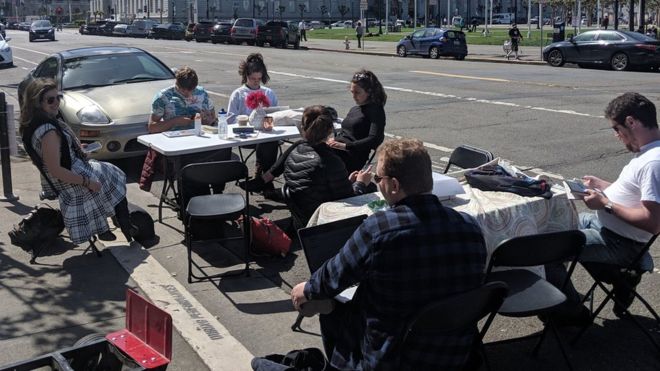People in the US Use Car Parking Spaces for Offices
Endless rows of car parking spaces are not only a sore sight, but they also take up unnecessary space. Most places in the USA have an overabundance of parking lots, going up to 37 parking spaces per household in Jackson, Wyoming.
In response, some people in San Francisco are overturning this wastage of space and resources. Under the hashtag #WePark, they are “parking” themselves in these spots, creating community-driven outdoor offices using free public WiFi networks or mobile data hotspots to work.
Source: BBC
Victor Pontis, the entrepreneur who came up with this innovative idea, says that he saw a photo of a truck with bike parking on it, captioned, “What if you could work out of a parking spot?” He thought that it was “a pretty funny idea”, and decided to convert it into reality. The first gathering happened at a parking lot near San Francisco’s City Hall, where 30 people turned up to set up their desks and work.
Why is #WePark needed?
The real estate market is highly expensive in the US right now. For young people, it is becoming increasingly harder to buy houses as the price of residential properties goes up with demand, while the space to build them constantly decreases. This is, in part, the fault of overly abundant car parking spaces in USA cities.
The #WePark initiative makes the concept of these car parking spaces becoming residential or commercial lots more tangible. Most spots are extremely cheap, typically ranging from $2-$3 per hour, making this movement cost-effective as well. On the other hand, rent prices in San Francisco have reached a whopping $84.16 per square foot, according to Cushman and Wakefield. This indicates an increase of 9.7% every year. In 2018, Business Insider reported that 12% of San Franciscan households can actually afford to buy a house. #WePark goes to show that if these spaces are utilized properly, real estate would become cheaper for all.
Also Read: Has Urban India Forgotten the Need for Parking Spaces?
Apart from residences, spaces occupied by parking supply could have become parks or bike-lanes, celebrating the people’s liveliness. This is not the first time someone has tried to turn a parking lot into a community-driven space – Brenda Puech from London has made the same effort by placing benches and plats around parking spots. These kinds of efforts seek to reduce the individualistic isolation that hectic work-weeks often promote. Instead, car parking spaces serve to glorify “a giant metal box”, as Jean Walsh, one of the first participants of #WePark, puts it.
Long-term effects
There are higher and more far-reaching effects of movements like this as well – if there are fewer car parking spaces freely available, people will be discouraged from using cars and some may even be persuaded to walk or use the subway instead. This translates to a small but direct hit against global warming which is currently threatening to irreversibly damage the planet within our lifetimes.
The #WePark initiative is not just confined to the US anymore. It has reached across the ocean to France as well, where young Valentin Décarpentrie has set up shop in a Toulouse parking spot. This is a sign of hope for millennials especially since both global warming and rising real estate prices will be most harmful to those who will have to live through them in the future.
It is the very absurdity of setting up a desk and a chair in the sun where cars are supposed to be parked that makes #WePark effective. It just goes to show how absurd the hike in real estate prices and the building of more parking spaces is. The initiative does not intend to take itself too seriously, having started from a funny comment Pontis once heard, but it conveys a powerful message regardless.

